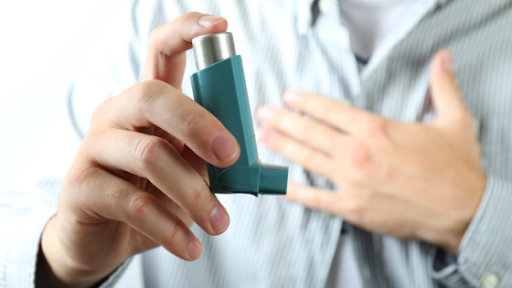Asthma is a medical condition that causes difficulty breathing due to the narrowing and inflammation of the airways in your lungs. This inflammation can be worsened by what we call “triggers” – things that tend to make asthma symptoms worse.
While there’s no cure for asthma, symptoms can be reduced by avoiding the most common triggers of inflammation in the lungs. Below is a list of 10 everyday asthma triggers to avoid:
Allergies
80% of people with asthma have allergies to things like the air, pollen, animal dander, mold, and dust mites. If you have asthma that’s hard to control, it’s recommended to see an allergist so they can determine what your allergies are and steps that can be taken to avoid them.
Asthma-Triggering Foods
Tree nuts, peanuts, cow’s milk, soy, wheat, eggs, fish, shrimp, shellfish, fresh fruits, and salad are all foods that can trigger asthma. In addition to these foods, preservatives such as sulfite additives, which are commonly used in food processing, can trigger isolated asthma as well. It’s best to limit or eliminate these products from your diet if you notice a higher chance of experiencing an asthma attack after eating them.
Heartburn
Up to 89% of people with asthma also experience severe heartburn (GERD). This type of heartburn is usually experienced at night while lying down. Normally, a valve prevents stomach acid from reaching your esophagus. For people with GERD, the value does not work as it should. If stomach acids reflux, or back up, into the esophagus, the inflammation caused could trigger an asthma attack. Avoid acidic foods such as tomatoes, oranges, chocolate, and fried, spicy, or fatty food.
Smoking
Not only are people who smoke more likely to develop asthma, but smoking with asthma can make symptoms like coughing or wheezing much worse. If you have asthma and are a smoker, quitting is important to protect your lungs from further damage and harm.
Exercise
Exercise is often the main asthma trigger, as heavy workouts cause airways to narrow. If you experience chest tightness, cough, and have trouble breathing during the first 15 minutes of a workout, you have exercise-induced asthma. While symptoms can go away in the next half hour or more of exercise, 50% of those with exercise-induced asthma may have another attack 6 to 10 hours later. Avoid strenuous exercise and exercising outdoors in very cold weather.
Medications
If you have asthma, it’s important to know the types of medications that can potentially trigger asthma attacks: Aspirin, ibuprofen, naproxen, beta-blockers (used for treating heart conditions, migraines, and glaucoma), and ACE Inhibitors (used for treating heart disease and high blood pressure).
If you are prescribed any medication that you suspect has made your asthma worse, consult with a doctor or pulmonary specialist.
Weather Changes
While you can’t control the weather, it’s important to take precautions on days that pose a higher risk of triggering asthma attacks. Be sure to bundle up as best as you can on cold days, as cold weather, changes in temperature, and humidity can all cause asthma attacks.
Irritants in the air
Smoke (tobacco or fireplaces), cleaning agents, and perfumes can all trigger asthma attacks. Be wary of environments where these irritants may be present to reduce the chance of inflammation in your airways.
Infections
It’s no surprise that infections pose a higher risk of triggering asthma attacks. While no one intentionally catches an infection, steps should be taken when knowingly visiting locations where the risk of infection is high. You may be more likely to have an attack for up to 2 months after an upper respiratory infection, so it is recommended to wear a mask when visiting high-risk locations to protect your lungs.
Strong Emotions
Stressful or strong emotions, such as anxiety, anger, yelling, crying, or laughing too hard, can trigger an asthma attack. The body’s response to stress triggers the immune system and causes the release of certain hormones, which can lead to inflammation within the airways of the lungs.
While stress can’t always be avoided, steps can be taken to limit the amount of stress one experiences. Take a moment to control your breathing, step away from the stressful situation, meditate, or try yoga. If self-management techniques aren’t enough, you may need to talk to your doctor about cognitive behavioral therapy or consider taking anti-anxiety medication.
Everyone reacts differently to triggers, so it is important to discuss your personal experience with your doctor to identify what triggers to look out for and avoid. While not every trigger can be avoided, keeping your doctor informed will help them create an asthma action plan that is right for you.
If you are looking to speak with a doctor about your asthma symptoms, click here to schedule an appointment with one of our pulmonary care specialists.


